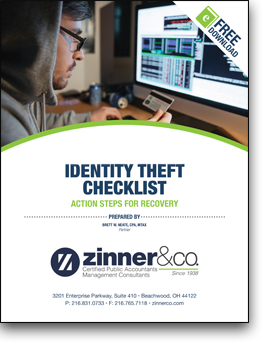In our increasingly digital world, safeguarding yourself from IT security concerns is crucial.
It feels like two or three times a day, there is a report in the media about a company admitting its data was breached and customer information, including passwords, was stolen.
Even large firms or companies such as Facebook, Twitter and Target have admitted to breaches.
The truth is, no organization is immune from these attacks.
What most people need to be told is that you need to protect yourself not only by paying attention, but by carefully managing your various passwords.
Pay Attention to Your Emails and Make Sure They Are Real
Zinner & Co. identity theft , fraud , Credit card fraudWe all get emails from UPS, Walmart, Costco and other big retailers, airlines or travel resorts, but are they real?
Cybercriminals are always looking for ways to get your information, steal money or steal your identity. They will create emails that look like they are from your bank, the IRS, a store you shop at, coworkers, relatives, or friends.
These emails will contain links they want you to click so you can enter your information. Unfortunately, once you do that, the damage is done.
IRS Alerts Taxpayers with Limited English Proficiency of Ongoing Phone Scams; Urges Caution Before Paying Unexpected Tax Bills
Brett W. Neate, CPA, MTax Brett W. Neate , Credit card fraud , IRSCon artists often approach victims in their native language, threaten them with deportation, police arrest and license revocation, among other things.
“These scammers continue to adapt and evolve, and the IRS continues to receive reports of these schemes using multiple languages trying to find victims across the country,” IRS Commissioner John Koskinen said.
Credit Cards and Fraud Liability: What Business Owners Need to Know
Zinner & Co. identity theft , Credit card fraudOn October 1, the landscape of fraud liability for credit card transactions changed significantly. Simply, businesses are now liable for fraudulent charges if or when a customer uses the EMV (Europay, MasterCard & Visa) chip-based card AND fraud still occurs AND that business did not upgrade their payment system. 
About Us

Since 1938, Zinner has counseled individuals and businesses from start-up to succession. At Zinner, we strive to ensure we understand your business and recognize threats that could impact your financial situation.
Recent Blog Posts
Categories
- 1031 Exchange (2)
- 401k (2)
- 529 plan (4)
- ABLE Act (1)
- account systems (3)
- accounting (8)
- Affordable Care Act (8)
- alimony (2)
- American Rescue Plan Act (1)
- Ask the Expert (5)
- Audit and Assurance Department (13)
- audits (8)
- Bank Secrecy Act (1)
- banks (1)
- Barbara Theofilos (6)
- Beneficial Ownership Information (1)
- Bitcoin (1)
- block chain (2)
- BOI (3)
- Bookkeeping (1)
- Brett W. Neate (28)
- budgets (1)
- Bureau of Worker's Compensation (12)
- Business - Management, Issues & Concerns (51)
- business income deduction (3)
- business succession (7)
- business travel expense (3)
- business valuation (5)
- capital gains (2)
- careers (7)
- cash flow (2)
- Charitable Donations (2)
- Child Tax Credit (2)
- Chris Valponi (8)
- City of Cleveland (1)
- Cleveland COVID-19 Rapid Response Fund (1)
- Cleveland Rape Crisis Center (2)
- college (3)
- Community (24)
- Compliance (1)
- Coronavirus (24)
- Corporate Transparency Act (1)
- COVID-19 (30)
- Credit card fraud (5)
- credit reporting (2)
- cryptocurrency (2)
- CTA (2)
- cybersecurity (17)
- dead (1)
- DeAnna Alger (6)
- death (2)
- debt (4)
- deductions (14)
- Deferring Tax Payments (4)
- Department of Job and Family Services (2)
- depreciation (2)
- Digital Tax Payment (3)
- divorce (4)
- DOMA (3)
- Economic Impact Payments (2)
- Economic Injury Disaster Loan (4)
- education (8)
- EIDL (1)
- electronic filing (4)
- Electronic Tax Payments (3)
- Emergency Working Capital Program (1)
- employee benefit plan auditor (1)
- Employee Leave (3)
- Employee or Independent Contractor (6)
- Employee Retention Credit (3)
- employment (2)
- ERC (3)
- Eric James (8)
- Estates, Gifts & Trusts (48)
- expenses (5)
- Families First Coronavirus Response Act (2)
- FASB (1)
- FBAR (1)
- FDIC coverage (1)
- Federal Assistance (4)
- filing (3)
- financial planning (8)
- Financial Planning - College (9)
- financing (3)
- Firm news (119)
- first responders (1)
- FMLA (1)
- foreign assets (3)
- fraud (38)
- FSA (1)
- fundraising (9)
- Gabe Adler (1)
- gift tax (5)
- HDHP (2)
- health care (3)
- home (2)
- home office (1)
- Howard Kass (2)
- HRA (1)
- HSA (5)
- identity theft (34)
- income (1)
- income tax (58)
- independent contractor (1)
- Inflation (1)
- Insurance (7)
- internal control (4)
- international (2)
- Intuit (1)
- investments (4)
- IRS (91)
- jobs (5)
- John Husted (1)
- K-1 (1)
- Laura Haines (3)
- Layoff (2)
- Layoffs (1)
- leadership (3)
- lease accounting standards (1)
- life insurance (1)
- LLC (3)
- Loans (2)
- longevity income annuities (1)
- Lorenzo's Dog Training (1)
- Magic of Lights (1)
- management advisory (3)
- manufacturing (2)
- Matt Szydlowski (3)
- medical (7)
- Medicare (2)
- mergers and acquisitions (1)
- Mike DeWine (2)
- Millennial Concepts (2)
- minimum wage (1)
- NAIOP (1)
- National Defense Act (1)
- non-profit reporting (10)
- non-profits (38)
- not-for-profit (26)
- OATC (1)
- OBBB (3)
- ODJFS (1)
- office (1)
- ohio (13)
- Ohio Accounting Talent Coalition (1)
- Ohio business owners (18)
- Ohio Department of Jobs and Family Services (4)
- Ohio Department of Taxation (7)
- Ohio Incumbent Workforce Training Voucher Program (1)
- Ohio Society of Certified Public Accountants (1)
- One Big Beautiful Bill (10)
- Online Tax Payment (4)
- Operations (2)
- OPERS (1)
- OSCPA (1)
- Overtime (2)
- owners of foreign entities (1)
- partnerships (5)
- passwords (1)
- Paycheck Protection Program (9)
- payroll (8)
- penalties (3)
- pension (2)
- personal finance (2)
- planning (4)
- ppp (7)
- Productivity (5)
- Qualified Business Income (1)
- quickbooks (10)
- real estate (14)
- record retention (2)
- records (2)
- Reporting (1)
- Republican National Convention (1)
- Retirement Planning & IRAs (54)
- Richard Huszai, CPA (5)
- RITA (1)
- Robin Baum (6)
- RRF (1)
- S Corporation (1)
- SALT (8)
- SBA (8)
- scams (14)
- SECURE 2.0 Act (1)
- security (6)
- SharedWorks (1)
- Shutdown (3)
- Silver Linings (9)
- simplified employee pension (1)
- Small Business (5)
- SMB (12)
- Social Media (1)
- social security (4)
- Speaker Series (2)
- spouse (1)
- start ups (8)
- Stay at Home Order (3)
- Steven Mnuchin (1)
- Sue Krantz (6)
- SVOG (1)
- tangible property (1)
- tax (27)
- tax avoidance (12)
- Tax Credit (7)
- Tax Cuts and Jobs Act of 2017 (31)
- Tax Exempt (1)
- Tax Holiday (1)
- Tax Interns (2)
- tax services (28)
- taxes (45)
- Taxes - Corporate & Business (107)
- Taxes - Individual (125)
- Taxes - Planning, Rules and Returns (198)
- TechCred (1)
- technology (8)
- The CARES Act (6)
- The SOURCE (1)
- tiag (3)
- transaction advisory (2)
- Treasury Department (5)
- Trump Account (1)
- tuition (3)
- U.S. Department of the Treasury (1)
- U.S. Small Business Administration (6)
- Unclaimed Funds (1)
- Unemployment Benefits (4)
- Unemployment Insurance (1)
- withdrawls (2)
- withholding (6)
- Workers Comp Billing Changes (1)
- Zinner & Co. (35)
- Zinner News (32)






